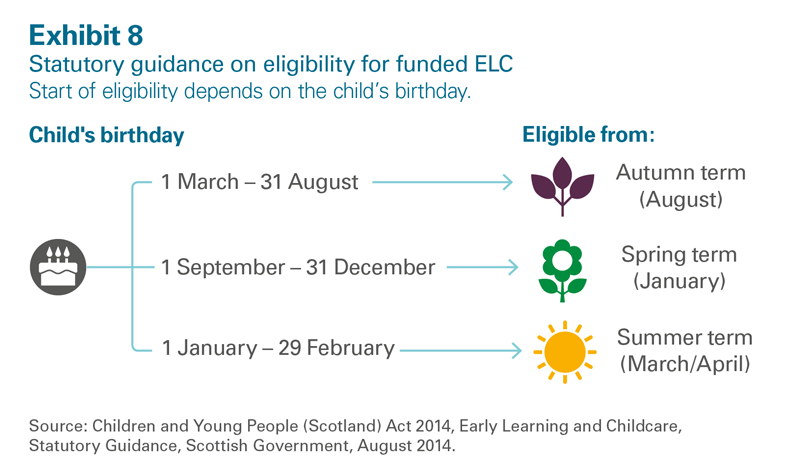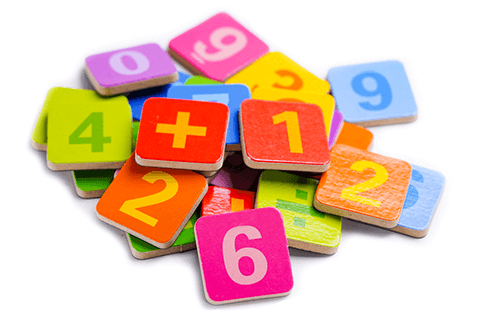Childcare in Scotland - a parents' guide

We published our third report on early learning and childcare on 1 June 2023. This looked at the progress made by the Scottish Government and councils to increase the hours of funded early learning and childcare to 1,140 hours by August 2021. We also looked at the Scottish Government's plans to measure whether the increase in hours will achieve what it's intended to for children and families.
We updated this guide for parents and carers in June 2023. The guide answers some frequently asked questions about funded ELC and how to get a place and we suggest some ways you can get more information and help. The guide also covers how we carried out our audits on this topic and what we found.
This guide has two parts:
- Part 1: Frequently asked questions about funded early learning and childcare and how to get a place
- Part 2: How we carried out our audit and what we found
What's in the guide
- What is funded ELC?
- What are the benefits of ELC?
- Does your child qualify for funded ELC?
- How does funded ELC work?
- How do you apply for a funded ELC place?
- How can you let your council know your thoughts on this?
- How we carried out our audit and what we found
- If you have other questions, how can you find out more?
Part 1: Frequently asked questions about funded early learning and childcare and how to get a place
What is funded early learning and childcare?
Funded early learning and childcare used to be called pre-school education, that is, education that children receive before they go to school.
But it's very difficult to separate learning from care for young children as they both happen at the same time. This change in name tries to reflect this.
The government and councils now use the term 'funded early learning and childcare' for where this type of care is paid for by councils. This is offered to all three- and four-year-olds as well as some two-year-olds and some five-year-olds. See our question on 'Does your child qualify for funded early learning and childcare?' for more information.
Funded early learning and childcare places are available in:
- school nurseries
- early years centres
- private nurseries
- nurseries run by a charity or a voluntary organisation
- playgroups
- childminders.
Funded ELC should be free at the point of use. This means you should not have to pay in advance for any funded hours your child receives.
If your child has a funded early learning and childcare place, this may be a part-time place each day during school term-time. Other options, such as longer places for fewer days, or places during school holidays as well as term-time are also available. These options vary by council.
Since August 2021, the number of funded hours per year available for children with a funded place is 1,140. This is the same as around 30 hours each week during school term-time. A school term is around 38 weeks a year.
What are the benefits of early learning and childcare?
Research has found high-quality early learning and childcare can have benefits for children's social, emotional and educational skills. Health Scotland reviewed the research on the different parts of early learning and childcare that can contribute to these benefits. You can find more information in their report. Parents that we spoke to as part of our 2018 audit were very positive about the benefits of early learning and childcare to their child - see our report for more information on this (PDF 799Kb).
Does your child qualify for funded early learning and childcare?
Working out when your child can get a funded place can be complicated, and different councils have different rules.
This will depend on the month your child was born and which council you want to use funded early learning and childcare in. Exhibit 8 below from our 2018 report sets out when children should be able to start their funded place depending on their birthday. But some councils provide places earlier than this.

Exhibit 8 Statutory guidance on eligibility for funded early learning and childcare
Start of eligibility depends on the child's birthday
If child's birthday is 1 March to 31 August, eligible from Autumn term (August)
If child's birthday is 1 September to 31 December, eligible from Spring term (January)
If child's birthday is 1 January to 29 February, eligible from Summer term (March/April)
Source: Children and Young People (Scotland) Act 2014, Early Learning and Childcare, Statutory Guidance, Scottish Government, August 2014
For the most up-to-date information it's best to check directly with your council. Councils might include this information on their website: try searching for 'early learning', 'childcare' or 'education'. Or you can call your council's main switchboard and ask to be put through to the right service.
Your child can get funded early learning and childcare when they are two if their parent or carer receives one, or more, of the following:
- Income Support.
- Jobseeker's Allowance (income-based).
- Any income-related element of Employment and Support Allowance.
- Child Tax Credit but not Working Tax Credit (with earnings of up to £18,725 per year. This figure is reviewed each year, so make sure you check with your local council).
- Both Working Tax Credit and Child Tax Credit (with earnings of up to £8,717 per year. This figure is reviewed each year, so make sure you check with your local council).
- Incapacity Benefit or Severe Disablement Allowance.
- State Pension Credit.
- Support under Part VI of the Immigration and Asylum Act 1999.
- Universal Credit with household take-home pay of £726 a month or less. Take-home pay is the money your household receives from work after tax, National Insurance and any pension contributions have been taken off. Your award letter will tell you how much your take-home pay is for the claim period. This should be £726 or less to qualify for funded ELC.
Your child can continue to get a funded place if you receive one of these benefits and then your circumstances change. For example, if you were receiving Universal Credit and you started a new job, which meant you stopped receiving Universal Credit, your child would keep their funded place.
If parents don't live together and one parent receives one of these benefits, but the other doesn't, your local council will decide if your child can get a funded place.
Two-year-olds can also get a funded early learning and childcare place if they have experience of care. This includes children who:
- Are looked after. This is where a child is placed in the care of their local council, through a voluntary agreement with their parents or a compulsory process such as a children's hearing or the court service.
- Are under a kinship care order. This is where a child is living full-time, or most of the time, with a relative or family friend because they are not able to live with their birth parents. The arrangement is made by:
- social work,
- the court or children's panel (or both).
The kinship carer will have some or all parental responsibilities, but the child is not looked after. - Have an appointed guardian. This is where a child's parent has died and had made arrangements in their will or other written documents for another adult to become the child's guardian.
Two-year-olds can also get a funded place if their parent has experience of care.
The date two-year-olds can start a funded place depends on their birthday and their local council. Exhibit 8 below from our 2018 report sets out when children should be able to start their funded place depending on their birthday. But some councils provide places earlier than this. For the most up-to-date information it's best to check directly with your council. Councils might include this information on their website: try searching for 'early learning', 'childcare' or 'education'. Or you can call your council's main switchboard and ask to be put through to the right service.

Exhibit 8 Statutory guidance on eligibility for funded early learning and childcare
Start of eligibility depends on the child's birthday
If child's birthday is 1 March to 31 August, eligible from Autumn term (August)
If child's birthday is 1 September to 31 December, eligible from Spring term (January)
If child's birthday is 1 January to 29 February, eligible from Summer term (March/April)
Source: Children and Young People (Scotland) Act 2014, Early Learning and Childcare, Statutory Guidance, Scottish Government, August 2014
If your two-year-old gets a funded place, they will continue to be able to have a funded place until they start school (see Can your five-year-old get a funded place? for more information). However, this might not always be a place in the same setting, as some councils offer different services for two-year-olds and three- and four-year-olds. See our question on Can you choose where your child goes? for more information.
All three-year-olds can get a funded early learning and childcare place. When children start their funded place depends on their birthday and your local council. Exhibit 8 below from our 2018 report sets out when children should be able to start their funded place depending on their birthday. But some councils provide places earlier than this.

Exhibit 8 Statutory guidance on eligibility for funded early learning and childcare
Start of eligibility depends on the child's birthday
If child's birthday is 1 March to 31 August, eligible from Autumn term (August)
If child's birthday is 1 September to 31 December, eligible from Spring term (January)
If child's birthday is 1 January to 29 February, eligible from Summer term (March/April)
Source: Children and Young People (Scotland) Act 2014, Early Learning and Childcare, Statutory Guidance, Scottish Government, August 2014
For the most up-to-date information it's best to check directly with your council. Councils might include this information on their website: try searching for 'early learning', 'childcare' or 'education'. Or you can call your council's main switchboard and ask to be put through to the right service.
All four-year-olds can get a funded early learning and childcare place. Once your child is at an age when they can start primary school they won't automatically get a funded early learning and childcare place. Some parents decide to defer their four-year-old starting school if they won't turn five until after school starts in August. The rules around what this means for funded early learning and childcare places are changing. From August 2023, children who won't turn five until after school starts in August, will automatically get an additional year of funded early learning and childcare, if their parent choses to defer them starting school. Talk to your council for more details on the process for deferral if this is something you are considering. The 'Options for children starting school' table below gives you more information on deferring the start of school.
Most children stop being eligible for a funded early learning and childcare place when they start school. The age that children start school depends on when their birthday falls in the year. The table below shows you the options from August 2023, for children starting school and how that affects their funded early learning and childcare place, depending on their birthday.
How does funded early learning and childcare work?
Our guide outlines when your child can get a funded place.
If your child can get a funded place, they can receive up to 1,140 hours of funded early learning and childcare each year. This works out at around 30 hours a week in school term-time. But the way in which local councils offer these 1,140 hours varies by area.
The options available vary across the country but may include:
- part-day places in a morning or afternoon
- full-day places
- places split across more than one setting, for example a school nursery and a private nursery, and other different options.
Councils are continuing to change the way in which services work. So it's always best to check with your local council for the most up-to-date information.
Councils might include this information on their website: try searching for 'early learning', 'childcare' or 'education'. Or you can call your council's main switchboard and ask to be put through to the right service.
Funded early learning and childcare places are not compulsory, so you don't need to send your child if you don't want to.
Funded early learning and childcare is not compulsory so you can choose to send your child for fewer than 1,140 hours.
In 2018, we found that some councils gave different priority to children who were applying for fewer hours when making decisions about places. Contact your local council to find out more about how it currently works in your area. Some councils list this information on their website: try searching for 'early learning', 'childcare' or 'education'. Or you can call the main switchboard and ask to be put through to the right service.
Some settings that offer funded early learning and childcare will let you buy extra hours of early learning and childcare beyond your funded place. Sometimes this is called wraparound care.
For example, if your child has a place three days a week, some settings might let you buy a place for another day of the week.
The nursery or other early learning and childcare setting that you're considering, for example a childminder or playgroup, will be able to give you more information on whether they provide this service and, if they do, what it costs.
You can contact your local council to find out how it works in your area. Some councils list this information on their website: try searching for 'early learning', 'childcare' or 'education'. Or you can call the main switchboard and ask to be put through to the right service.
Councils can arrange with other neighbouring councils to offer funded early learning and childcare places to children who live in a different council area. For example, some parents who work in a different council area to where they live prefer their child to have a funded early learning and childcare place near their work.
Contact your council to find out more about how this works in your area. Some councils list this information on their website: try searching for 'early learning', 'childcare' or 'education'. Or you can call the main switchboard and ask to be put through to the right service.
Funded early learning and childcare places should be free at the point of use, which means there should be no need to pay in advance and wait to get the money back.
Depending on local arrangements, there may be some charges for extras available for children.
For example, you might be asked to pay additional fees for optional extras, such as outings or extra activities depending on local arrangements. If you decide that you don't want your child to take part in these optional extras, they should still be able to get their funded hours. If the setting where your child goes also offers extra wraparound hours above the 1,140 that are funded, and you decide to use this service then you'll be asked to pay for these extra hours.
Children should get a free meal when they are at a funded early learning and childcare session. This should apply to any funded session that a child goes to, even if it includes some extra wraparound hours that you pay a separate charge for.
Early learning and childcare settings, such as council or private nurseries or childminders, can join a Scottish Government scheme to provide a free healthy snack and milk to children. Settings that sign up to the scheme with their local council should offer the milk (or non-dairy alternative if required) and snack to children who are getting two hours or more of childcare a day.
Your local council, or the particular funded early learning and childcare setting you're considering will be able to give you more information on any additional costs. They'll also be able to give you more details on how snacks and meals work in a specific setting.
How do you apply for a funded early learning and childcare place?
The process for applying for places is different in each council. But most councils either ask you to:
- apply directly to the place where you want your child to go, or
- list the places you would prefer on one application form in the order you prefer.
Your local council can give you more information on which system it uses.
Some councils include this information on their website: try searching for 'early learning', 'childcare' or 'education'. Or you can call your council's main switchboard and ask to be put through to the right service.
The Scottish Government's Parent Club - Opens in a new window website allows you to find links to the relevant parts - Opens in a new window of your local council's website.
You should get some choice over where your child is offered a place, but you don't have a right to choose exactly where the council offers your child a place. Councils should consider your preferences when deciding where to offer your child a place. However, this doesn't guarantee you'll get the place you want.
As part of providing flexibility to parents, councils are expected to offer funded places with a range of providers and with different session times to reflect local needs. But you are still not guaranteed to get exactly the place you want in a specific setting.
You can choose to apply for a funded early learning and childcare place for your child in different types of places. These vary by council, but can include:
- council-run nurseries (sometimes these are part of a primary school)
- private nurseries or nurseries run by voluntary groups or charities
- playgroups
- childminders.
There may be some differences in places you can choose from, depending on the age of your child. For example, council nurseries may not all take eligible two-year-olds and some councils may offer places for two-year-olds with childminders, but not places for older children.
You might want to consider which type of funded early learning and childcare would best suit you and your child when you're thinking about applying.
Your local council should be able to provide you with information on the options in your local area. Some councils list this information on their website: try searching for 'early learning', 'childcare' or 'education'. Or you can call the main switchboard and ask to be put through to the right service.
The Scottish Government's Parent Club - Opens in a new window website has more information on choosing a place for your child.
You might also want to consider the following when you're deciding where to apply.
- The Care Inspectorate - Opens in a new window and Education Scotland - Opens in a new window report on the quality of early learning and childcare in different settings. So, you might want to look at these reports for the places you're interested in applying to.
- You may find it helpful to visit the places you're considering. This gives you the chance to find out what the facilities are like and meet the staff. Try to make an appointment before you go to make sure staff have enough time to talk to you.
- Speaking to other parents in your neighbourhood to find out about the different options available to you.
- Different places may have different opening times and lengths of session. It might be helpful to think about what you need and consider this when you're deciding where to apply.
- Where your child might go to primary school. If there's a nursery attached to your child's future school, you may want to consider applying for a place there.
- Your current childcare arrangements. If you're already using childcare, and your current provider offers funded places, you may want to consider whether you want to change this, or whether you'd prefer to keep things the same as they are now.
This varies by council and when your child's birthday is. To find out the most up-to-date information on this, contact your local council.
Some councils list this information on their website: try searching for 'early learning', 'childcare' or 'education'. Or you can call the main switchboard and ask to be put through to the right service.
This varies by council and when you submit your form. To find out the most up-to-date information on this contact your local council. Some councils list this information on their website: try searching for 'early learning', 'childcare' or 'education'. Or you can call the main switchboard and ask to be put through to the right service.
This varies by area. In some councils a central admissions team decides; in others the local nursery or other early learning and childcare setting, for example a playgroup, decides.
Contact your local council to find out more about how it works in your area. Some councils list this information on their website: try searching for 'early learning', 'childcare' or 'education'. Or you can call the main switchboard and ask to be put through to the right service.
Normally there isn't an appeals process for funded early learning and childcare places, unlike applications for school. If you're unhappy with the decision, you should contact your council.
How can you let your council know your thoughts on this?
Councils regularly consult with parents on funded early learning and childcare and what they and their children need. This should help councils decide how to plan their services.
They often use online surveys, but sometimes hold focus groups or meetings with parents. Your local council will be able to give you more information on any planned consultation in your area or other ways you can feed in your views.
Part 2: How we carried out our audit and what we found
How we carried out our audit and what we found
We're independent of the Scottish Government. We check that public organisations such as local councils and the Scottish Government spend their money properly and effectively. To do this, we audit them and publish reports on what we find.
The Scottish Parliament - Opens in a new window or the Accounts Commission - or both - consider our reports. We make recommendations to the organisations we audit to help them improve.
Find out more about what we do here on our website.
This audit was our third report on early learning and childcare. Our first audit was published in February 2018 and our second in early March 2020. This third audit looked at the following:
- Progress made by the Scottish Government and councils to increase the hours of funded early learning and childcare available to children and families to 1,140 hours by August 2021. 1,140 hours of funded early learning and childcare is the same as around 30 hours a week of funded early learning and childcare during school term-time. A school term is around 38 weeks a year. We explain funded early learning and childcare here.
- What progress the Scottish Government has made in planning how it will measure whether the increase in hours will achieve what it's intended to for children and families.
During our audit we gathered information from many sources, including:
- interviews with staff in the Scottish Government, Care Inspectorate, National Day Nurseries Association, Scottish Childminding Association, Convention of Scottish Local Authorities, Scottish Futures Trust and other national bodies
- a focus group with council staff involved in providing the increase in hours
- information from councils on progress with increasing hours
- reviewing documents produced by councils on increasing hours
- reviewing documents from national groups involved with increasing hours
- reviewing surveys of parents' views done by the Scottish Government and other bodies.
- The Scottish Government and councils did well to be able to offer the extra hours to eligible children whose family wanted a place, by August 2021, during the Covid-19 pandemic. Councils completed most of the building works for the extra hours and got the large number of extra staff they needed in place.
- Take up among three- and four-year-olds remains high and most parents are happy with the flexibility of the ELC available to them. More two-year-olds are now receiving funded hours than when we looked at this in 2020, but many more are estimated to be eligible and not using the funded hours. The Scottish Government and partners have made progress with plans for sharing information that will allow councils to identify eligible two-year-olds, such as families receiving particular benefits.
- This is a flagship policy that's important to other Scottish Government plans to reduce child poverty and to support economic transformation. Around £1 billion is invested in it annually. But the sector is fragile. Budget pressures and risks around workforce and the sustainability of funded providers, such as private nurseries and childminders, risk limiting flexibility and choice for families, which is important to what the policy is intended to achieve for children and their families.
- In 2021/22 councils spent £956 million on pre-primary education. Splitting out how much spending is specific to the expansion is complex. The Scottish Government doesn't know how much has been spent in total by councils on bringing in the extra hours between 2018/19 and 2021/22. The Scottish Government plans to look at the value for money of the policy by comparing the costs and outcomes (what the policy is hoped to achieve for children and their families) of providing 600 hours of early learning and childcare in 2018/19 with the costs and outcomes of delivering the new 1,140 hours in 2023/24.
- There's been more delays in developing software needed to improve the management and monitoring of early learning and childcare services. Also, data gaps still exist around how staff move between providers (such as nurseries) in the private and third sector into council nurseries and whether funded providers (such as private and third sector settings that offer the funded hours) pay the living wage.
- It's too early to tell whether the expansion has achieved what it's intended to for children and increased opportunities for their parents to work, study or train. The Scottish Government has developed plans for how it will measure this and collect the necessary data. The impact of Covid-19 on children's development and their families' economic circumstances will make this more challenging. Whether the policy has achieved what it intended to for children and their families will be covered in our future audit work.
You can get more detailed information on our findings in our full audit report - Opens in a new window (PDF 705Kb)
If you have other questions, how can you find out more?
- Parent Club - Opens in a new window has advice on early learning and childcare and links to local council websites.
- The Scottish Government - Opens in a new window publishes information about how early learning and childcare works nationally and future changes to 1,140 hours.
- Your local council can give you information on how services work in your area. Some councils list this information on their website: try searching for 'early learning', 'childcare' or 'education'. Or you can call the main switchboard and ask to be put through to the right service.
- mygov.scot - Opens in a new window has a guide on help paying for childcare that includes information on funded early learning and childcare and links to local council websites.
- The Scottish Childminding Association - Opens in a new window has advice for parents on choosing a childminder and a search function to find a childminder.
- The National Day Nurseries Association - Opens in a new windowhas information for parents, including a fact sheet on choosing a nursery in Scotland.
Topics
What's on this page
- What is funded ELC?
- What are the benefits of ELC?
- Does your child qualify for funded ELC?
- How does funded ELC work?
- How do you apply for a funded ELC place?
- How can you let your council know your thoughts on this?
- How we carried out our audit and what we found
- If you have other questions, how can you find out more?








